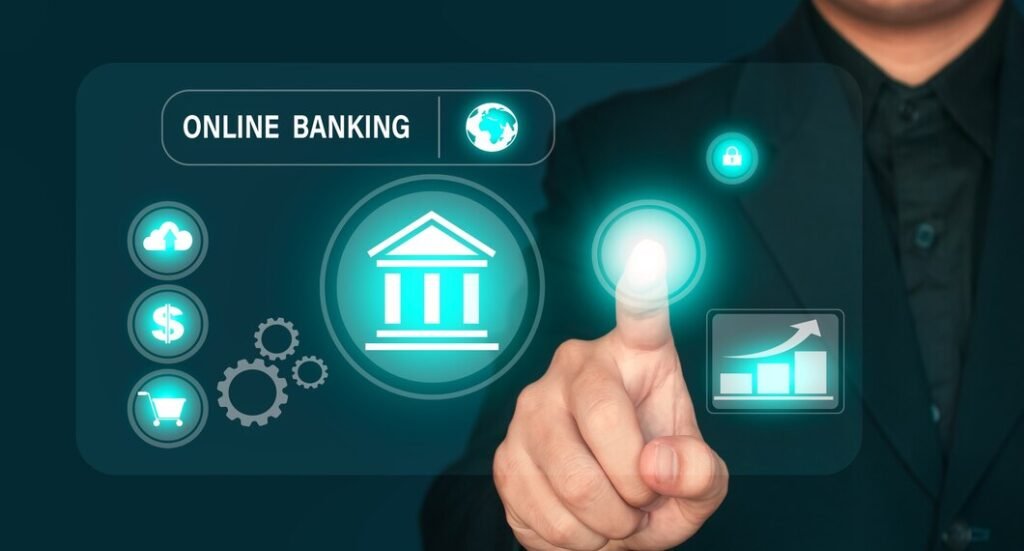Open banking has emerged as potentially of the most pivotal thought in the money related region, setting out new entryways for the two purchasers and associations. The thought, which engages outcast providers to get to purchaser banking data with their consent, is reshaping the financial natural framework by propelling straightforwardness, enabling progression, and growing contention. By allowing clients to share their financial information securely, open banking has prepared for an extent of new money related things and organizations planned to be more specially crafted, accessible, and canny.
Open Banking Empowering Consumers with Control Over Financial Data
Open banking is a phenomenal thought in the financial region that licenses buyers to securely grant their money related data to outcast providers through open application programming association focuses (APIs). This enables a more related and clear financial climate, where customers have more unmistakable control over their money related information and can get to a greater extent of financial organizations.
Financial Ecosystem A Complex Web of Interconnected Players
The monetary biological system is a mind boggling organization of different foundations, administrations, and innovations that all in all help the progression of cash and work with financial action. At its financial ecosystem center, the environment incorporates customary monetary establishments, for example, banks, insurance agency, and trading companies, as well as arising players like fintech new businesses, advanced wallets, and blockchain networks. These substances cooperate to offer a scope of items, from reserve funds and credits to installments, protection, and venture administrations.
Fintech Integration Bridging Traditional Finance and Modern Technology
Fintech coordination alludes to the method involved with integrating imaginative monetary advances into customary monetary frameworks to upgrade productivity, further develop client encounters, and smooth out tasks. By coordinating advances like man-made brainpower, blockchain, distributed computing, and computerized installment arrangements, monetary foundations can offer more customized, secure, and easy to understand administrations.
What is Open Banking?
At its center, open financial alludes to the act of imparting monetary information to outsider suppliers through open application programming connection points (APIs), with the customer’s express assent. This permits fintech organizations and other approved substances to get to and break down a client’s financial information, which can incorporate data about exchanges, ways of managing money, and record adjusts. In return, purchasers get to additional customized monetary items and administrations, for example, planning apparatuses, constant installment arrangements, and custom-made loaning choices.
The Job of APIs in Open Banking
The underpinning of open banking is the utilization of use programming connection points (APIs), which are sets of conventions that permit different programming frameworks to speak with one another. With regards to open banking, APIs empower outsider suppliers to safely get to client information from banks, Visa organizations, and other monetary foundations. These APIs consider a consistent progression of data among banks and fintech organizations, empowering constant exchange handling, installments, and information sharing.
The utilization of APIs enjoys a few upper hands over customary techniques for information sharing. APIs are quicker, safer, and simpler to execute, permitting monetary establishments to offer more adaptable and inventive administrations. Moreover, APIs establish a climate where information sharing should be possible on-request and with the buyer’s assent, giving straightforwardness and command over private monetary data.
How Open Banking is Reshaping the Monetary Environment
Improving Customer Experience
Open banking can possibly significantly further develop the shopper experience by offering more customized and easy to understand monetary items. By permitting outsider suppliers to get to buyer information, open banking empowers the formation of instruments and administrations that are explicitly custom fitted to individual monetary requirements. For instance, planning applications can follow ways of managing money and recommend effective cash saving tips in light of a client’s genuine exchanges. Also, buyers can analyze different advance or credit items all the more effectively, as their monetary information is naturally pulled to work out the best rates.
This degree of personalization and convenience was hard to accomplish in the customary financial framework, where buyers frequently needed to depend on a restricted scope of contributions and could collaborate with their bank’s exclusive items. Open financial separates these boundaries, making a more client driven monetary environment where buyers can get to different administrations that suit their inclinations and monetary objectives.
Expanding Monetary Incorporation
Furthermore, open banking can assist people with restricted or no record of loan repayment to get sufficiently close to monetary items. By breaking down spending designs and other monetary ways of behaving, fintech organizations can offer better-designated items, in any event, for individuals who have been avoided from conventional credit scoring frameworks. This sets out new open doors for monetary administrations in underserved markets, offering items that are more comprehensive and available to a more extensive scope of individuals.

Advancing Rivalry and Advancement
Open financial encourages a more serious monetary climate by empowering new participants, for example, fintech new companies, to contend with customary banks. In a customary financial framework, enormous banks normally have an imposing business model over client information, making it hard for more modest organizations to contend on neutral ground. Open financial makes everything fair by giving admittance to similar information, permitting more modest organizations to improve and make particular monetary items.
The expanded rivalry likewise helps shoppers, as monetary organizations and fintech organizations are boosted to offer better items and lower costs to draw in and hold clients. The development prodded by open banking has proactively prompted the improvement of new monetary items, including computerized wallets, robo-warning administrations, and settlement ahead of time arrangements. As fintech organizations keep on improving, we can hope to see much more different and client driven contributions later on.
Further developing Straightforwardness and Control
Open financial gives buyers more prominent straightforwardness and command over their monetary information. With customary banking, purchasers frequently have restricted understanding into how their information is being utilized by monetary foundations. Open banking, then again, requires unequivocal assent for information offering and gives purchasers to the capacity to disavow access whenever.
This degree of straightforwardness is significant for building trust among shoppers and monetary organizations. By giving shoppers more command over their information, open financial cultivates a feeling of safety and strengthening, which is fundamental for expanding reception and use of monetary administrations. Also, open banking can prompt better monetary proficiency, as customers acquire knowledge into their spending examples, reliability, and generally speaking monetary wellbeing.
Decreasing Expenses and Expanding Proficiency
For banks and other monetary organizations, open banking can assist with lessening costs and work on functional effectiveness. By permitting outsider suppliers to foster new items and administrations, banks can zero in on their center contributions, like stores and credits, while profiting from a more extensive scope of administrations gave by fintech organizations. This can prompt expense reserve funds, as banks can diminish their need to foster new items in-house.

Also, open banking can smooth out back-end cycles, for example, installment handling, extortion identification, and consistence observing. The utilization of APIs empowers continuous information move, lessening delays and working on the speed of exchanges. For purchasers, this implies quicker installments, faster credit endorsements, and a more consistent in general insight.
Administrative Systems Supporting Open Banking
Notwithstanding PSD2, different nations have executed their own open financial guidelines. For instance, the Unified Realm has presented the Open Financial Drive, which requires the nine biggest banks to make their information that anyone could hope to find to outsider suppliers through APIs. Also, nations like Australia, Canada, and Japan are fostering their own structures to help open banking and energize contest in the monetary area.
These guidelines are fundamental for guaranteeing that open banking works in a protected, straightforward, and buyer cordial way. By setting clear rules for information sharing, security, and assent, these guidelines assist with moderating dangers and construct trust among buyers and monetary foundations.
Difficulties and Dangers of Open Banking
Another test is the requirement for shopper instruction. Numerous buyers may not completely comprehend the idea of open banking or how their information is being utilized. Monetary foundations and fintech organizations should put resources into teaching their clients about the advantages and dangers of open banking, as well as how to actually deal with their assent inclinations.
At long last, the incorporation of open saving money with heritage frameworks can be intricate and exorbitant for monetary foundations. Many banks actually depend on obsolete framework, which can make it hard to execute open financial APIs and guarantee consistent information imparting to outsider suppliers. Conquering these specialized hindrances will require huge interest in innovation and cycle enhancement.
The Fate of Open Banking
As we push toward a more interconnected and computerized monetary scene, open financial will proceed to develop and grow. By 2025, we can hope to see more prominent reception of open banking across the globe, with additional nations carrying out guidelines to help information sharing and development. The ascent of computerized just banks, fintech organizations, and blockchain innovations will probably drive further disturbance in the customary financial area, with open financial assuming a focal part in empowering new plans of action.
Before very long, we may likewise see further developed utilizations of open banking, for example, the utilization of man-made consciousness and AI to examine monetary information and proposition more customized monetary exhortation. As the monetary environment turns out to be more interconnected, open financial will keep on driving development, further develop buyer experience, and make a more comprehensive and productive worldwide monetary framework.
Conclusion
Open banking is reshaping the monetary biological system by engaging shoppers with more noteworthy command over their information, empowering development, and advancing rivalry. As additional shoppers and monetary organizations take on open financial practices, the monetary administrations scene will turn out to be progressively unique, with a more extensive scope of customized and reasonable items accessible to purchasers. While open financial presents specific difficulties, including information protection concerns and specialized joining obstacles, its capability to change the monetary business is colossal. As administrative systems proceed to develop and innovation propels, open financial will keep on assuming a significant part in making a more available, straightforward, and proficient monetary environment for what’s to come.


